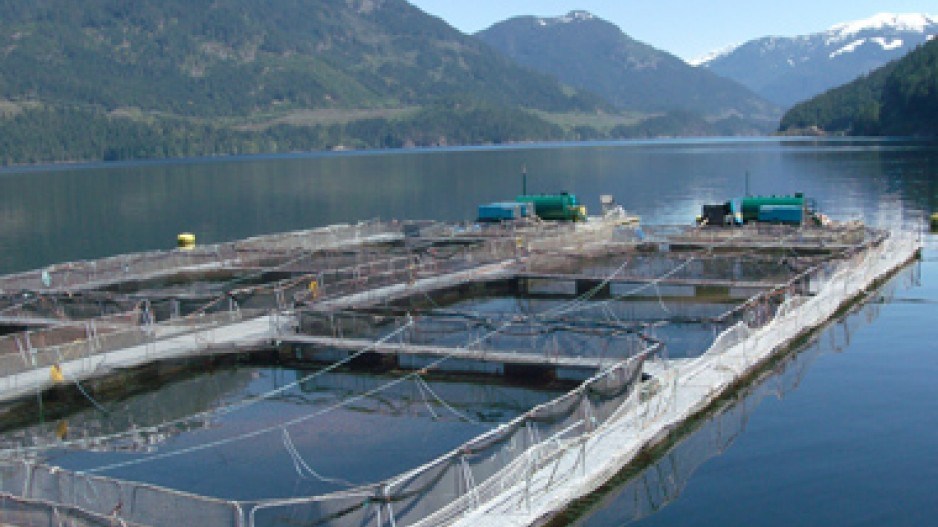“So long, and thanks for all the fish.”
B.C. Premier John Horgan didn’t exactly quote that title from Douglas Adams’ Hitchikers Guide to the Galaxy series at a press conference today, but that seemed to be the message he was giving to B.C. salmon farming industry.
He did quote from Bob Dylan, however.
It was in response to questions about the need for resource industries, including fish farm operators, to get the consent of First Nations for all future development projects, as per the newly embraced United Nations Declaration on the Rights of Indigenous Peoples (UNDRIP).
“Times, they are a-changing,” Horgan said during a press briefing October 18.
Horgan was responding to questions about a letter his minister of Agriculture, Lana Popham, sent to Marine Harvest last week.
It essentially puts the company on notice that it may not have its tenure for its Port Elizabeth salmon farm renewed when it expires in 2018, due to objections of local First Nations.
In recent weeks, First Nations and anti-fish farm activist Alexandra Morton have occupied a number Marine Harvest’s fish farms. The First Nations in the area of the Broughton Archipelago where the fish farms are located say the company does not have their permission to operate.
Marine Harvest ended up bringing in the RCMP October 13 when restocking its Port Elizabeth fish farm, for fear of being blockaded. Popham suggested that was a regrettable decision.
“The decision to restock occurs as we are entering into sensitive discussions with some of the First Nations in the Broughton Archipelago who remain opposed to open net pen salmon farming in their territories,” she wrote.
It’s not just Marine Harvest’s tenure that could be in question. All salmon farm tenures are going to be subject to review, Horgan said, and it will done according to guidelines and principles set out in the Cohen Commission and UNDRIP.
“We are going to be reviewing tenures, consistent with the Cohen Commission recommendation to ensure that migratory routes for wild salmon are clear of obstacle or any other deterrent – not just fish farms – but other obstacles to making their way either out to sea or out to spawn,” Horgan said.
He referred to one of the recommendations made by the Cohen Commission in response to drastically low Fraser River sockeye returns in 2009. It recommended locating salmon farms away from migratory routes used by wild salmon, as a precautionary measure, due to concerns about disease and sea lice spreading from fish farms to wild stocks.
Salmon farming generates $1.5 billion in economic activity in B.C. and directly employs 3,000 people, according to economic analysis released last month by the BC Salmon Farmers Association.
Marine Harvest has operated in B.C. for three decades. When one reporter said it looked like the NDP government was pulling the rug out from under the company, Horgan responded: “Tenures are for a fixed term. They’re not in perpetuity, and I’m sure Marine Harvest understands that.
“It’s known to almost everyone in the universe that open net pen fish farming in British Columbia has been controversial for decades,” Horgan said.
“It’s been a long-standing problem over many different governments, and I believe I’m in a unique position, when the federal government is focused on the dwindling salmon stocks here in British Columbia, that we can find a way to make sure that we’re having the mutual objectives of keeping economic activity going as well protecting our wild fish.”
He also seemed to suggest that the way forward is land-based closed containment systems, not ocean-based open-net fish farms. He pointed to the Kuterra fish farm in Alert Bay as a model.
“The facility has proven itself to be effective,” he said. “You can grow fish on land, you can market them, and they’re taken up by the market because they say ‘closed containment.’ There’s a bigger appetite for closed containment Atlantic salmon than there is for open net pen fish.”
If that model were economically viable, Marine Harvest spokesman Ian Roberts wondered why the Namgis First Nation, the owner and sole shareholder, is now trying to divest itself of Kuterra. He added that Horgan’s tone is unsettling.
“The NDP opinion of salmon farming in B.C. has long been unsettling to us,” Roberts said. “We operate a very responsible business, but they keep pretending that closed containment is a viable solution when I believe no solution is required.
“We all know that Kuterra is up for sale and there’s no buyers, so that is a significant error in judgment if he thinks that putting up Kuterra as the poster child for close containment is doing him any favours.”
He added Kuterra sent a letter offering to sell the closed containment operation to Marine Harvest. He said Marine Harvest has no interest in buying it.
“It costs you more to produce (fish) than you’re going to get in the market,” he said. “It’s not a money maker.
“To be brutally honest, if closed containment was a winner, we would set it up near the big markets of San Francisco and L.A. You wouldn’t be growing that in the northern part of Vancouver Island.”




